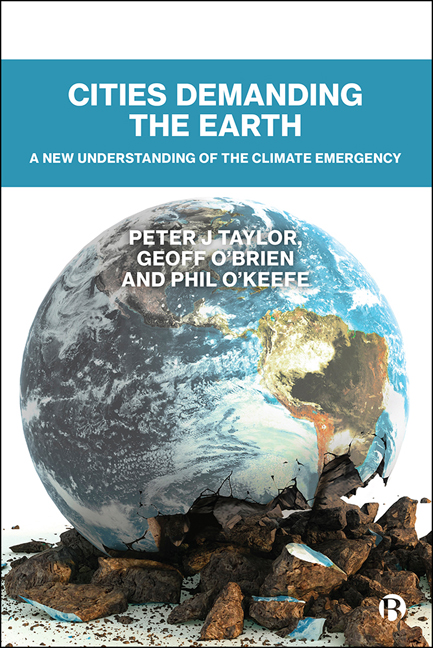Book contents
- Frontmatter
- Dedication
- Contents
- List of Tables and Figures
- About the Authors
- Preface
- 1 Declarations: Root and Branch Unthinking
- 2 Alternate: Jane Jacobs’ legacy
- 3 Inside Out: Fourteen Antitheses Authenticating Cities
- 4 Reset: Anthropogenic Climate Change is Urban, not Modern
- 5 Action: Can We Stop Terminal Consumption?
- References
- Appendix: Primer on Climate Change Policy
- Index
1 - Declarations: Root and Branch Unthinking
Published online by Cambridge University Press: 19 March 2021
- Frontmatter
- Dedication
- Contents
- List of Tables and Figures
- About the Authors
- Preface
- 1 Declarations: Root and Branch Unthinking
- 2 Alternate: Jane Jacobs’ legacy
- 3 Inside Out: Fourteen Antitheses Authenticating Cities
- 4 Reset: Anthropogenic Climate Change is Urban, not Modern
- 5 Action: Can We Stop Terminal Consumption?
- References
- Appendix: Primer on Climate Change Policy
- Index
Summary
The enormity of the problem has only just dawned on quite a lot of people…. Unless we sort ourselves out in the next decade or so we are dooming our children and our grandchildren to an appalling future…. What we do now, and in the next few years, will profoundly affect the next few thousand years. (David Attenborough, speech at Davos, Switzerland, January 2019)
Introduction: unwelcome statements of the evident
Things are not going well in the world of climate change policy and action. There are myriad initiatives and innovations, not least in alternative energy, but somehow it never seems enough. The threat of global warming and its numerous dire consequences are unrelenting. Why? It is not that we do not know what is happening; the science is conclusive, extensively reported and widely accepted, albeit not universally. Obviously humanity's overall responses to these authoritative warnings are wholly inadequate. But this answer only elicits another question, why inadequate? It is this second ‘why’ that we attempt to answer in this book. Put simply, we think that the basic framing of the global climate change debate – scientists providing compelling evidence so that governments can collectively produce the urgently required policies – is deeply flawed.
We begin this book with a set of Declarations. These are eight statements of our starting position, blunt pronouncements that are the foundations of our thinking. Hence we do not discuss and debate current climate change policy and action; we treat its failing as a given. We do not offer ways of improving what is being done through building on successes and avoiding known pitfalls. This is not a ‘how-to-do-better’ manual. We do not belittle the very important work being done in the field, but these efforts are known to be wanting overall. They don't add up to anything that looks like an adequate solution. Despite multiple exhortations to sort it out there is a feeling of exasperation every time a new set of climate science warnings is published. It seems to be not so much a matter of ‘what can be done?’ as admitting ‘what can't be done?’ We present what we think are intractable obstacles that appear to be blocking a credible path ahead and suggest an alternative way forward.
- Type
- Chapter
- Information
- Cities Demanding the EarthA New Understanding of the Climate Emergency, pp. 1 - 16Publisher: Bristol University PressPrint publication year: 2020



